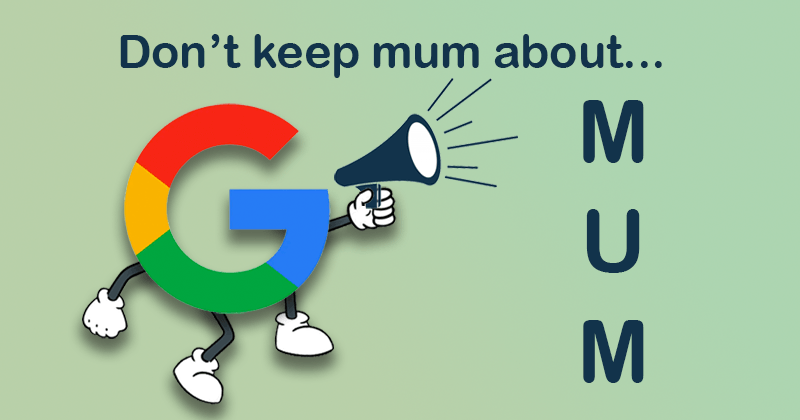Don't Keep Mum About Google's MUM

Google does it again! The world of search is abuzz with their latest Search innovation and that’s MUM. 1000x more powerful than Google’s BERT, MUM is Google’s latest language model incarnation that may help make Search Engine Optimizers a thing of the past.
What is Google’s MUM?
MUM stands for Multitask Unified Model. A great multitasker, MUM is a new artificial intelligence milestone that lets users ask complex queries that require complex answers. Unlike our current “keyword” speak, MUM could take a complex question like, “I’ve hiked Mt. Adams and now want to hike Mt. Fuji, what should I do different to prepare?” and give you a thoughtful answer, full of nuances, an answer you might get from an expert mountaineer. That’s the power of MUM.
How does Google’s MUM provide complex answers?
There are three powerful capabilities that let users ask complex questions and MUM to provide thoughtful answers.
MUM can perform multiple queries at the same time
This capability is what makes MUM a great multitasker and able to answer complex questions. MUM is able to connect information from different sources and provide unified answers. Google states that the ability to multitask lets MUM run numerous tasks all at the same time, giving MUM a more complete understanding of the world that surrounds us. MUM uses the T5 text-to-text framework and is 1000x times more powerful than Google’s current language model, BERT. BERT freed users from “keyword” speak by being able to understand the context around words, enabling users to ask simple direct questions, while MUM takes it a step further, answering complex queries using multiple languages, images and text, which I explain next.
MUM can “understand” and “generate” language and information
MUM is multi-lingual and can converse in 75 languages. Having been trained on so many languages, MUM can pull information in any language it understands to answer a query in whichever language the user is asking. MUM does not need to match keywords, it can “understand” and then “generate” that information in whatever language it chooses. So using the example of climbing Mount Fuji above, in its answer to the query, MUM can pull information and “learn” from Japanese sources and then provide the answer in English. This is really revolutionary.
MUM is multimodel
Like humans, MUM can see and “learn” from all different types of information, whether that’s text, images or video. As a user, you could upload a picture of your mountain boots and ask MUM if they would suffice for Mt. Fuji, or conversely, MUM could answer the query about how to prepare for Mt. Fuji with the different types of boots you should wear.
Google describes how MUM would use its capabilities to answer the query, I’ve hiked Mt. Adams and now want to hike Mt. Fuji, what should I do different to prepare?
MUM could understand you’re comparing two mountains, so elevation and trail information may be relevant. It could also understand that, in the context of hiking, to “prepare” could include things like fitness training as well as finding the right gear. Since MUM can surface insights based on its deep knowledge of the world, it could highlight that while both mountains are roughly the same elevation, fall is the rainy season on Mt. Fuji so you might need a waterproof jacket. MUM could also surface helpful subtopics for deeper exploration — like the top-rated gear or best training exercises — with pointers to helpful articles, videos and images from across the web.
How will Google’s MUM impact Search?
We haven’t quite retooled our resumes yet, but undoubtedly, MUM will impact Search greatly. Since MUM doesn’t need to rely on keyword matching, it will no longer be possible to optimize for specific keywords. Keywords will still have a place, as they will be involved in queries, but a specific website rank will no longer be tied to your use of the specific keywords. We have always said that it’s better to write for people rather than search engines, and now this is more true than ever.
MUM is still in the experimental stage. Google is still evaluating MUM, making sure that relevant and useful info is surfaced when complex queries are asked, so it might be some time before MUM is released. The more complex the questions and answers, the more Google ends up taking responsibility in providing the right answer, and so it’s extremely important that they get it right, that answers are accurate and fair, and they don’t introduce bias into the system. Judging from Google’s past performance, we have great confidence that they’ll succeed. But, not to worry, we won’t be out of job, there’s still a lot more work to be done for Search!
We keep up to the constant change in search so you don’t have to. Contact us today.
